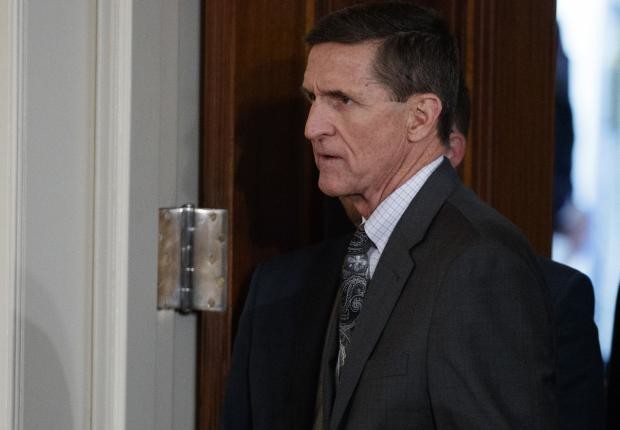
In this photo, taken Feb. 13, 2017, Mike Flynn arrives for a news conference in the East Room of the White House in Washington. Flynn, President Donald Trump’s former national security adviser, who was fired from the White House last month, has registered as a foreign agent with the Justice Department for work that may have aided the Turkish government in exchange for $530,000. (Photo by EVAN VUCCI/AP)
WASHINGTON — President Donald Trump was not aware that his former national security adviser, Michael Flynn, had worked to further the interests of the government of Turkey before appointing him, White House press secretary Sean Spicer said Thursday.
Spicer’s comments came two days after Flynn and his firm, Flynn Intel Group Inc., filed paperwork with the Justice Department formally identifying himself as a foreign agent and acknowledging that his work for a company owned by a Turkish businessman could have aided Turkey’s government.
Asked whether Trump knew about Flynn’s work before he appointed him as national security adviser, Spicer said, “I don’t believe that that was known.”
Flynn and his company filed the registration paperwork describing $530,000 worth of lobbying before Election Day for Inovo BV, a Dutch-based company owned by Turkish businessman Ekim Alptekin. In an interview with The Associated Press, Alptekin said Flynn did so after pressure from Justice Department officials.
Flynn was fired from his job as national security adviser by Trump last month. The filing this week was the retired US Army lieutenant general’s first acknowledgement that his consulting business furthered the interests of a foreign government while he was working as a top adviser to Trump’s presidential campaign. Flynn’s disclosure that his lobbying may have benefited Turkey’s authoritarian government led by President Recep Tayyip Erdogan comes as Flynn has drawn scrutiny from the FBI for his contacts with Russian officials.
In paperwork filed with the Justice Department’s Foreign Agent Registration Unit, Flynn and his firm acknowledged that lobbying from August through November “could be construed to have principally benefited the Republic of Turkey.” According to the filings, the lobbying contract ended after Trump’s election in November.
After Flynn joined the Trump administration, he agreed not to lobby for five years after leaving government service and never to represent foreign governments. Flynn’s newly disclosed lobbying would not have violated that pledge because it occurred before he joined the Trump administration in January, but the pledge would preclude Flynn from ever doing the same type of work again in his lifetime.
Under the Foreign Agent Registration Act, US citizens who lobby on behalf of foreign governments or political entities must disclose their work to the Justice Department. Willfully failing to register is a felony, though the Justice Department rarely files criminal charges in such cases. It routinely works with lobbying firms to get back in compliance with the law by registering and disclosing their work.
On Wednesday, Alptekin told The AP that Justice Department officials had pushed for Flynn and his firm to register as foreign agents in recent weeks. Alptekin said in a phone call from Istanbul that the changes were a response to “political pressure” and he did not agree with Flynn’s decision to file the registration documents with the Justice Department.
“I disagree with the filing,” he said. “It would be different if I was working for the government of Turkey, but I am not taking directions from anyone in the government.”
Calls to phone numbers associated with Flynn and his firm weren’t answered Wednesday or Thursday. Flynn’s attorney, Robert Kelner, did not respond to questions about whether the Justice Department or FBI had contacted Flynn about his lobbying activities. Kelner declined to comment through a spokesman for his law firm, Covington & Burling.
Reached Wednesday afternoon, an official at the Turkish embassy in Washington said he would refer the questions to the embassy spokesman. The spokesman did not respond.
Trump fired Flynn last month for misleading Vice President Mike Pence and other administration officials about his contacts with Russia’s ambassador to the US, Sergey Kislyak. As a key member of Trump’s transition team last December, Flynn spoke by phone several times with Kislyak during the period when former President Barack Obama expelled 35 Russian diplomats from the US and levied new sanctions in response to Russian election-related hacking. –Stephen Braun and Chad Day
* * *
Associated Press writer Julie Bykowicz contributed to this report.